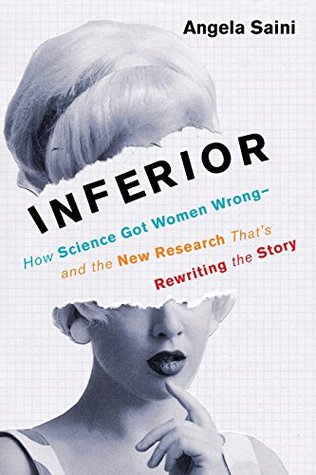More on this book
Community
Kindle Notes & Highlights
by
Angela Saini
When we turn to scientists for resolution, we assume they will be neutral. We think the scientific method can’t be biased or loaded against women. But we’re wrong.
“The sexism of science coincided with the professionalization of science. Women increasingly had less and less access,” she explains.
It was, after all, only in wealthier middle-class circles that women tended not to work. For many Victorians, women’s incomes were vital to keeping families afloat. The difference between men and women wasn’t the amount of work they did, but the kind of work they were allowed to do.
In evolutionary terms, drawing assumptions about women’s abilities from the way they happened to be treated by society at that moment was narrow-minded and dangerous. Women had been systematically suppressed over the course of human history by men and their power structures, Gamble argued. They weren’t naturally inferior. They just seemed that way because they hadn’t been allowed the chance to develop their talents.
Fausto-Sterling belongs to a vanguard of biologists and psychologists who see the nature versus nurture question as old-fashioned. “There is a better way of looking at the body and how it works in the world, and understanding the body as a socially formed entity, which it is,” she explains. Men and women may be different, but only in the same way that every individual is from the next. Or, as she has also put it, “that gender differences fall on a continuum, not into two separate buckets.”
Study after study has shown almost all behavioral and psychological differences between the sexes to be small or nonexistent.
“Science doesn’t operate in a political vacuum,” she explains. “I think there are some sciences which can be more objective than others. But we are dealing with people, we’re not the Large Hadron Collider.”
Unlike particle physics, neuroscience is about humans, and it has profound repercussions for how people see themselves.
Another factor that prompts people to behave this way is that we like to justify the social system we’re in. If everyone around us thinks that women are less rational or worse at parking, even the thinnest piece of information that reinforces that assumption will be pasted into our minds. Research that confirms what appears to be obvious seems right. Anything that contradicts it, meanwhile, is dismissed as aberrant.
Indeed, it’s possible to argue that if ever there was proof that females aren’t naturally chaste or coy, it’s the extraordinary lengths to which some males go to keep them faithful.
Primatologist and anthropologist Sarah Blaffer Hrdy believes that all this—the systematic and deliberate repression of female sexuality for millennia—is what really lies behind the myth of the coy, passive female.
Systems of male control—patriarchies—emerged that exist to this day. And as they accumulated land, property, and wealth, it would have become even more important for men to be sure their wives were unswervingly faithful. A man who couldn’t guarantee his babies were his own wasn’t just being cuckolded but also risked losing what he owned. Mate guarding intensified.
Female sexuality had been suppressed for so long that scientists didn’t even question whether this modesty and meekness might not be biological at all.
“When men understand that the best way to solve their own problem is to help women solve those that men have created for women, they will have taken one of the first significant steps toward its solution. . . . The truth will make men free as well as women.” It’s a message as timely then as it is now.
Because what science tells us about women profoundly shapes how society thinks about the sexes. The battle for minds in the fight for equality has to include the biological facts.


